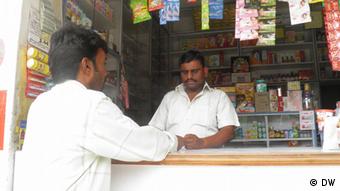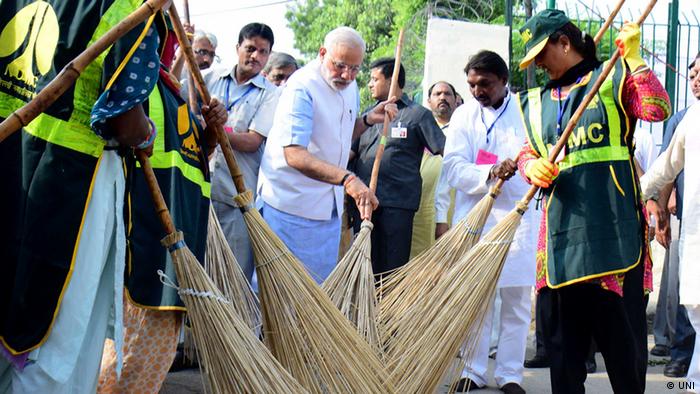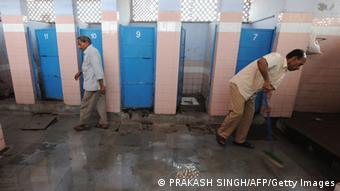Health
India's growing problem with 'superbugs'
- Date 12.12.2014
- Author Gabriel Domínguez
The global use of antibiotics is surging, especially in India - the
world's largest consumer - where drug-resistant bacteria are yearly
killing tens of thousands of newborns. Experts warn the 'superbugs' are
spreading.
Scientists are linking the overuse of antibiotics to the emergence of new "superbugs," or bacteria resistant to most antibiotics currently in use. And no place seems to be more affected at the moment than India, where more than 58,000 newborns died in 2013 alone due to infections attributed to superbugs, according to a recent study.
India is the single largest antibiotics-consuming country in the world, according to another recent study, titled Global antibiotic consumption 2000 to 2010: an analysis of national pharmaceutical sales data published in The Lancet medical journal this July. In the course of these 10 years, overall retail antibiotic consumption in the world's second-most populous country increased by about 68 percent to nearly 13 billion antibiotic pills in 2010, according to the research.
On average, an Indian citizen consumed about 11.7 antibiotic pills in 2010. However, the US still accounted for far more antibiotic consumption than any other country per capita, with a rate of more than twice that of India.
The report also found that the use of antibiotics rose an alarming 36 percent worldwide, with five countries - Brazil, Russia, India, China and South Africa (BRICS) - responsible for more than three-quarters of that surge. While this is welcome evidence that more people are able to access and purchase these medicines, the problem lies in the fact that use of these drugs is not being effectively monitored by health officials.
Boosting resistance
While the evolution of resistant strains is a natural phenomenon, the World Health Organization (WHO) says that use and misuse of antimicrobial drugs accelerates their emergence. Poor infection control practices, inadequate sanitary conditions and inappropriate food-handling encourage the further spread of the resistance.
Consequently, researchers have determined that the overuse of antibiotics has led to a loss of efficacy among antibiotics used to combat not only the most common illnesses, but also two classes of drugs long considered "last resort" for illnesses without any other known treatment. In addition this development has led to the emergence of superbugs, such as carbapenem-resistant Enterobacteriaceae (CRE), which are resistant to almost all available antibiotics.
Ramanan Laxminarayan, director of the Center for Disease Dynamics, Economics & Policy in New Delhi and co-author of the study, told DW that while the emergence of these superbugs is not yet happening on a mass scale, "we're starting to see the beginning of when the antibiotics are not working as well."
Inappropriate usage
But why is India so strongly affected? Dr. Timothy R. Walsh, a professor of microbiology at Cardiff University told the New York Times that "India's dreadful sanitation, uncontrolled use of antibiotics and overcrowding coupled with a complete lack of monitoring the problem has created a tsunami of antibiotic resistance that is reaching just about every country in the world."

Many of India's poor prefer to get drugs from the pharmacist or retailers, instead of visiting the doctor
The problem is compounded by the fact that India is regarded as having one of the world's worst sanitation records, prompting PM Narendra Modi to make public health as well as the country's garbage and sanitation troubles one of his government's key priorities. Some 594 million people in India - nearly 50 percent of country's population - defecate in the open, according to UNICEF. This, alongside with overflowing drains and uncovered sewers, contributes to the rapid dissemination of drug-resistant infections, experts say.
Massive costs
Analysts agree that antibiotic-resistant bacteria are spreading across countries more easily now than ever before due to increased globalization. "There have been several incidences where superbugs such as CRE are imported by humans traveling from Southeast Asian countries and India to Europe, North America and Australia," said Laxminarayan.
Furthermore, it is projected that millions of people worldwide will die of drug resistant infections by 2050. A study, titled Review on Antimicrobial Resistance, presented by economist Jim O'Neill on December 11, estimates that figure to be more than 10 million. The world economy would also suffer to the tune of up to 100 trillion USD unless action is taken, said O'Neill.
India's policy makers have been repeatedly criticized for failing to effectively regulate the use of antibiotics. To prevent over-the-counter (OTC) sales of important antibiotics, the Indian authorities reacted last March by banning the prescription-free sale of 46 drugs, including 24 antibiotics, such as third and fourth generation cephalosporins, carbapenems, anti-tuberculosis drugs and newer fluoroquinolones.
Moreover, retail pharmacies are now subject to surprise inspections by government inspectors to check for violations, said Laxminarayan, who is also a research scholar with the Princeton Environmental Institute.
Restricting availability
But the expert also emphasized that this was not enough to tackle the spread of antibiotic resistance as several other antibiotics are still available OTC. There are also other factors such as the unwillingness of patients to undergo diagnostic tests, patients' expectations of being given antibiotics, incentives for pharmacists on drug sales, and lack of knowledge about appropriate use among general public.
This is why analysts such as Laxminarayan believe that India must limit OTC availability of stronger antibiotics and launch widespread public campaigns aimed at the general public and pharmacists in order to increase awareness.
Dr. Arjun Srinivasan, an expert on antibiotic use and resistance at the Center for Disease Control and Prevention (CDC) in the United States, recommends that consumers ask whether an antibiotic is likely to be beneficial to combat an illness: "It is important to understand that, although they are very useful drugs, antibiotics designed for bacterial infections are not useful for viral infections such as a cold, cough, or the flu."
Moreover, consumers should take the drugs exactly as told by their healthcare providers, not use antibiotics prescribed for someone else and not pressure providers to prescribe an antibiotic.
© 2014 Deutsche Welle |
...and I am Sid Harth




No comments:
Post a Comment